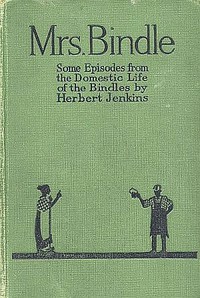Mrs. Bindle: Some Incidents from the Domestic Life of the Bindles, Jenkins [popular romance novels TXT] 📗

- Author: Jenkins
Book online «Mrs. Bindle: Some Incidents from the Domestic Life of the Bindles, Jenkins [popular romance novels TXT] 📗». Author Jenkins
"Now you make a bolt for that there stile," said Bindle, jerking his thumb in the direction where Mrs. Bindle had just disappeared, "and you'll find Mrs. B. somewhere on the other side."
With another apprehensive glance at the bull, Mr. Hearty turned and made towards the stile. His pace was strangely suggestive of a man cheating in a walking-race.
The sight of his quarry escaping seemed still further to enrage the bull. With a terrifying roar it dashed furiously at the gate.
The sound of the roar lent wings to the feet of the flying Mr. Hearty. Throwing aside all pretence, he made precipitately towards the stile, beyond which lay safety. For a few seconds, Bindle stood watching[Pg 196] the flying figure of his brother-in-law. Then he turned off to the right, along the hedge dividing the meadow from the field occupied by the bull.
"Well, 'ere's victory or Westminster Abbey," he muttered as he crept through a hole in the hawthorn, hoping that the bull would not observe him. His object was to warn the farmer of the animal's escape.
Half an hour later, he climbed the stile over which Mrs. Bindle had disappeared; but there was no sign either of her or of Mr. Hearty.
It was not until he reached the Summer-Camp that he found them seated outside the Bindles' tent. Mr. Hearty, looking pasty of feature, was endeavouring to convey to his blanched lips a cup of tea that Mrs. Bindle had just handed to him; but the trembling of his hand caused it to slop over the side of the cup on to his trousers.
"'Ullo, 'ere we are again," cried Bindle cheerily.
"I wonder you aren't ashamed of yourself," cried Mrs. Bindle.
Bindle stared at her with a puzzled expression. He looked at Mr. Hearty, then back again at Mrs. Bindle.
"Leaving Mr. Hearty and me like that. We might have been killed." Her voice shook.
"That would 'ave been a short cut to 'arps an' wings."
"I'm ashamed of you, that I am," she continued, while Mr. Hearty turned upon his brother-in-law a pair of mildly reproachful eyes.[Pg 197]
"Well, I'm blowed," muttered Bindle as he walked away. "If them two ain't IT. Me a-leavin' them. If that ain't a juicy bit."
Mr. Hearty was only half-way through his second cup of tea when the Bishop of Fulham, followed by several of the summer-campers, appeared and walked briskly towards them.
"Where's that husband of yours, Mrs. Bindle?" he enquired, as if he suspected Bindle of hiding from him.
"I'm sure I don't know, sir," she cried, rising, whilst Mr. Hearty, in following suit, stepped upon the tails of his coat and slopped the rest of the tea over his trousers.
"Ah," said the bishop. "I must find him. He's a fine fellow, crossing the field behind that bull to warn Mr. Timkins. If the beast had happened to get into the camp, it would have been the very—very disastrous," he corrected himself, and with a nod he passed on followed by the other campers.
"That's just like Bindle," she complained, "not saying a word, and making me ridiculous before the bishop. He's always treating me like that," and there was a whimper in her voice.
"It's—it's very unfortunate," said Mr. Hearty nervously.
"Thank you, Mr. Hearty," she said. "It's little enough sympathy I get."[Pg 198]
II
It was not until nearly four o'clock that Bindle re-appeared with the intimation that he was ready to conduct Mr. Hearty to call upon Farmer Timkins with regard to the strawberries, the purchase of which had been the object of Mr. Hearty's visit.
"Won't you come, too, Elizabeth?" enquired Mr. Hearty, turning to Mrs. Bindle.
"Thank you, Mr. Hearty, I should like to," she replied, tightening her bonnet strings as if in anticipation of further violent movement.
Mr. Hearty gave the invitation more as a precaution against Bindle's high-spirits, than from a desire for his sister-in-law's company.
"'Ere, not that way," cried Bindle, as they were making for the gate leading to the road.
Mr. Hearty looked hesitatingly at Mrs. Bindle, who, however, settled the question by marching resolutely towards the gate.
"But it'll take a quarter of an hour that way," Bindle protested.
"If you think I'm going across any more fields with wild bulls, Bindle, you're mistaken," she announced with decision. "You've nearly killed Mr. Hearty once to-day. Let that be enough."
With a feeling of thankfulness Mr. Hearty followed.
"But that little bit o' beef is tied up with a ring[Pg 199] through 'is bloomin' nose. I been an' 'ad a look at 'im."
"Ring or no ring," she snapped, "I'll have you know that I'm not going across any more fields. It's a mercy we're either of us alive."
Bindle knew that he was not the other one referred to, and he reluctantly followed, grumbling about long distances and various veins.
Although upon the high-road, both Mrs. Bindle and Mr. Hearty were what Bindle regarded as "a bit jumpy."
From time to time they looked about them with obvious apprehension, as if anticipating that from every point of the compass a bull was preparing to charge down upon them.
They paused at the main-entrance to the farm, allowing Bindle to lead the way.
Half-way towards the house, their nostrils were assailed by a devastating smell; Mr. Hearty held his breath, whilst Mrs. Bindle produced a handkerchief, wiped her lips and then held it to her nose. She had always been given to understand that the only antidote for a bad smell was to spit; but she was too refined to act up to the dictum without the aid of her handkerchief.
"Pigs!" remarked Bindle, raising his head and sniffing with the air of a connoisseur.
"Extremely insanitary," murmured Mr. Hearty. "You did say the—er bull was tied up, Joseph?" he enquired.
"Well, 'e was when I see 'im," said Bindle, "but of[Pg 200] course it wouldn't take long for 'im to undo 'imself."
Mr. Hearty glanced about him anxiously.
In front of the house the party paused. Nowhere was anyone to be seen. An old cart with its shafts pointing heavenward stood on the borders of a duck pond, green with slime.
The place was muddy and unclean, and Mrs. Bindle, with a look of disgust, drew up her skirts almost to the tops of her elastic-sided boots.
Bindle looked about him with interest. A hen appeared round the corner of the house, gazed at the newcomers for a few seconds, her head on one side, then disappeared from whence she had come.
Ducks stood on their heads in the water, or quacked comfortably as they swam about, apparently either oblivious or indifferent to the fact that there were callers.
From somewhere in the distance could be heard the sound of a horse stamping in its stall.
At the end of five minutes an old man appeared carrying a pail. At the sight of strangers, he stopped dead, his slobbering lips gaping in surprise.
"Can I see Mr. Timkins?" enquired Mr. Hearty, in refined but woolly tones.
"Farmer be over there wi' Bessie. I tell un she'll foal' fore night; but 'e will 'ave it she won't. 'E'll see. 'e will," he added with the air of a fatalist.
Mr. Hearty turned aside and became interested in the ducks, whilst Mrs. Bindle flushed a deep vermilion. Bindle said nothing; but watched with enjoyment the confusion of the others.[Pg 201]
The man stared at them, puzzled to account for their conduct.
"Where did you say Mr. Timkins was to be found?" enquired Mr. Hearty.
"I just tell ee, in the stable wi' Bessie. 'E says she won't foal; but I know she will. Why she——"
Mr. Hearty did not wait for further information; but turned and made for what, from the motion of the man's head, he took to be the stable.
The others followed.
"No, not there," yelled the man, as if he were addressing someone in the next field. "Turn round to left o' that there muck 'eap."
A convulsive shudder passed over Mr. Hearty's frame. He was appalled at the coarseness engendered by an agricultural existence. He hurried on so that he should not have to meet Mrs. Bindle's eye.
At that moment Farmer Timkins was seen approaching. He was a short, red-faced man in a bob-tailed coat with large flapped-pockets, riding-breeches and gaiters. In his hand he carried a crop which, at the sight of Mrs. Bindle, he raised to his hat in salutation.
"Mornin'."
"Good afternoon," said Mr. Hearty genteelly.
The farmer fixed his eyes upon Mr. Hearty's emaciated sallowness, with all the superiority of one who knows that he is a fine figure of a man.
"It was you that upset Oscar, wasn't it?" There was more accusation than welcome in his tone.
"Upset Oscar?" enquired Mr. Hearty, nervously[Pg 202] looking from the farmer to Mrs. Bindle, then back again to the farmer.
"Yes, my bull," explained Mr. Timkins.
"It was Oscar wot nearly upset pore old 'Earty," grinned Bindle.
"A savage beast like that ought to be shot," cried Mrs. Bindle, gazing squarely at the farmer. "It nearly killed——"
"Ought to be shot!" repeated the farmer, a dull flush rising to his face. "Shoot Oscar! Are you mad, ma'am?" he demanded, making an obvious effort to restrain his anger.
"Don't you dare to insult me," she cried. "You set that savage brute on to Mr. Hearty and it nearly killed him. I shall report you to the bishop—and—and—to the police," she added as an after-thought. "You ought to be prosecuted."
Mrs. Bindle's lips had disappeared into a grey line, her face was very white, particularly at the corners of the mouth. For nearly two hours she had restrained herself. Now that she was face to face with the owner of the bull that had nearly plunged her into mourning, her anger burst forth.
The farmer looked from one to the other in bewilderment.
"Report me to the police," he repeated dully. "What——"
"Yes, and I will too," cried Mrs. Bindle, interpreting the farmer's strangeness of manner as indicative of fear. "Mad bulls are always shot."
The farmer focussed his gaze upon Mrs. Bindle, as[Pg 203] if she belonged to a new species. His anger had vanished. He was overcome by surprise that anyone should be so ignorant of bulls and their ways as to believe Oscar mad.
"Why, ma'am, Oscar's no more mad than you or me. He's just a bit fresh. Most times he's as gentle as a lamb."
"Don't talk to me about lambs," cried Mrs. Bindle, now thoroughly roused. "With my own eyes I saw it chasing Mr. Hearty across the field. It's a wonder he wasn't killed. I shall insist upon the animal being destroyed."
The farmer turned to Bindle, as if for an explanation of such strange views upon bulls in general and Oscar in particular.
"Oscar's all right, Lizzie," said Bindle pacifically. "'E only wanted to play tag with 'Earty."
"You be quiet!" cried Mrs. Bindle. She felt that she already had the enemy well beaten and in terror of prosecution.
"I suppose," she continued, turning once more to Mr. Timkins, "you want to hide the fact that you're keeping a mad bull until you can turn it into beef and send it to market; but——"
"Turn Oscar into beef!" roared the farmer. "Why, God dang my boots, ma'am, you're crazy! I wouldn't sell Oscar for a thousand pounds."
"I thought so," said Mrs. Bindle, looking across at Mr. Hearty, who was feeling intensely uncomfortable, "and people are to be chased about the country and murdered just because you won't——"[Pg 204]
"But dang it, ma'am! there isn't a bull like Oscar for twenty miles round. Last year I had—let me see, how many calves——"
"Don't be disgusting," she cried, whilst Mr. Hearty turned his head aside, and coughed modestly into his right hand.
Mr. Timkins gazed from one to the other in sheer amazement, whilst Bindle, who had so man[oe]uvred as to place himself behind Mrs. Bindle, caught the farmer's eye and tapped his forehead significantly.
The simple action seemed to have a magical effect upon Mr. Timkins. His anger disappeared and his customary bluff geniality returned.
He acknowledged Bindle's signal with a wink, then he turned to Mrs. Bindle.
"You see, ma'am, this is all my land, and I let the bishop have his camp——"
"That doesn't excuse you for keeping a mad bull," was the uncompromising retort. The life of her hero had been endangered, and Mrs. Bindle was not to be placated by words.
"But Oscar ain't mad," protested the farmer, taking off his hat and mopping his forehead with a large coloured-handkerchief he had drawn from his tail-pocket. "I tell you he's no more mad than what I am."
"And I tell you he is," she retorted, with all the assurance of one thoroughly versed in the ways of bulls.
"You see, it's like this here, mum," he said soothingly, intent upon placating one who was not "quite all[Pg 205] there," as he would have expressed it. "It's all through the wind gettin' round to the sou'west. If it hadn't been for that——"
"Don't talk to me about such rubbish," she interrupted scornfully. "I wonder you don't say it's because there's a new moon. I'm not a fool, although I haven't lived all my life on a farm."
The farmer looked about him helplessly. Then





Comments (0)